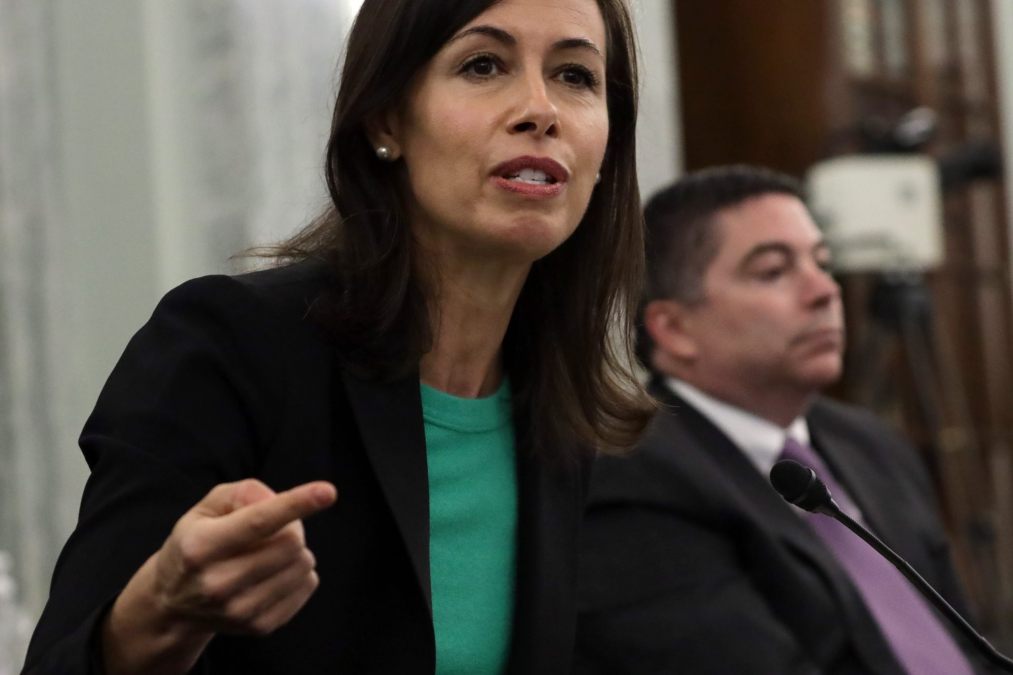Will Jessica Rosenworcel make the FCC’s $20 billion broadband auction fair?

Dogged for years by broadband mapping standards that allowed internet service providers to overstate their coverage areas, the Federal Communications Commission last year launched a new rural broadband fund designed in part to fill in those gaps. But the first auction held last fall for the new $20.4 billion Rural Digital Opportunity Fund did not go as smoothly as the FCC’s leaders claimed at the time.
The commission’s critics now say some internet providers were able to exaggerate their abilities to affordably fill in those rural gaps, leading to the FCC wrongly disbursing precious federal broadband funds.
“It’s hard to estimate just how many things have gone wrong,” Christopher Mitchell, the director of community networks at the Institute for Local Self-Reliance, told StateScoop.
But Mitchell and others also say the FCC’s new acting chairwoman, Jessica Rosenworcel, can steer the new fund back on course — if she acts soon.
‘A deliberate decision’
Rosenworcel, one two Democrats on the commission, was installed Jan. 21 after the inauguration of President Joe Biden, succeeding Ajit Pai, a one-time telecom lobbyist who led the FCC through the Trump administration. But Mitchell and Jon Chambers, a former chief of the commission’s Office of Strategic Planning and Policy Analysis, told StateScoop the RDOF’s fate is already in Rosenworcel’s hands.
Designed under Pai, the first phase of the RDOF auction, encouraged regional and national telecommunications companies to bid against each other for $16 billion in grants to build out broadband networks in census blocks that, according to the FCC, were entirely unserved. The second phase, containing the remaining $4 billion, will rely on the FCC’s new, more granular data collection method, though it has not been scheduled yet.
Up until the “very end,” RDOF was set to run smoothly, said Chambers, who designed auctions during his time at the commission.
But the auction went awry, Chambers and Mitchell said. While most FCC auctions distribute spectrum, attracting major providers with established infrastructure like Verizon and AT&T, this one awarded money, which brought in a field of speculative “financial bidders” — ISPs that the FCC assumed to have the capability to build out broadband networks.
To win the auction, Mitchell said, these bidders artificially lowered the prices of broadband deployment — sometimes to 1% of what the FCC was offering — to prevent competitors from winning.
“The FCC made a deliberate decision that instead of making sure there were qualified entities using realistic technology in the auction, they’d rather have more bidders and that the problems would sort themselves out,” Mitchell said. “They did not.”
Hands-off
Under Pai, a Republican, the FCC took a “hands-off” approach to vetting ISPs that wanted to enter the auction. But Mitchell said some of the resulting behavior was akin to fraud, adding that he was “blindsided” by the number of bidders that appeared to be gaming the auction.
One bidder identified by Mitchell, the Minnesota-based LTD Broadband, won $1.3 billion in the auction to provide gigabit-speed broadband to more than 500,000 locations over the next 10 years using fiber optic cables. But the company, which primarily provides fixed wireless internet, doesn’t use fiber, which is expensive and time-consuming to deploy, which Mitchell said made him skeptical of LTD’s ability to make good on its prize.
A second auction for the remaining $4 billion has not been scheduled yet, but the FCC’s current plans for it do not call for closer scrutiny of potential bidders.
“You can have a well-designed auction and still mess up in the execution,” Chambers said.
Changing the rules
But the FCC has a history of changing the rules after the fact to accommodate auction winners that show that they cannot live up to terms they initially agreed upon in an auction, Mitchell said. As a result, he said, companies that bid in the RDOF “have an expectation” that if they’re not able to complete their obligated buildout, the FCC will change rules for them.
In September 2019, for instance, the FCC modified the testing requirements for satellite internet providers only after a satellite ISP called ViaSat won more than $122 million in the Connect America Fund Phase II, which distributed funding for broadband expansion. Other satellite internet providers, including HughesNet, declined in advance to participate in the CAF II auction because it said satellite internet technology — including that of its competitors, like ViaSat — couldn’t meet the quality standards required by the FCC. ViaSat argued prior to the auction that it could meet the FCC’s standards, which were then changed following their victory. The commission argued that changing the rules benefitted all ISPs that might bid in FCC auctions in the future, calling its decision “reasonable” both “in substance and in being made retroactive.”
“To be sure, we recognize that modifying the testing conditions now, after the conclusion of the CAF Phase II auction, may upset the expectations of losing bidders or those who elected not to participate, including Hughes, who claims to have not bid in the CAF Phase II auction based on its view that the pre-auction testing conditions as clarified in the Performance Measures Order were difficult or impossible to meet,” the FCC wrote in a report and order in September 2019.
There’s no reason for “suspect” companies that bid aggressively in the first phase of RDOF to think the FCC won’t do the same for them, Mitchell said.
“One of the reasons we are seeing these concerning results in the auction is because the FCC has a history of barely levying slaps on the wrist to companies that violate the rules,” he said. “The FCC took a hands-off approach to keeping fraud out of the auction, and some of us are concerned that it looks like there’s a lot of fraud in the auction now.”
Long-form solutions
But Mitchell and Chambers both said Rosenworcel has an opportunity to take a tougher line. With the first phase of the auction complete, the FCC will soon begin reviewing the winning bidders’ long-form applications that include financial projections, plans for how they will build out their networks, what technologies they’ll use and the resources they’ll need.
The FCC can choose to cancel an award if a company’s long-term plan isn’t satisfactory, Chambers said, and it’s within Rosenworcel’s scope of power as chair to enforce stricter standards for long-form applications.
“The FCC could rubber stamp and say ‘we’ll see what happens in two to four years’ or the FCC could say ‘we don’t have enough faith in what you’ve shown us. You either have to show us more evidence or we’ll cancel the reward’,” Mitchell said.
Chambers suggested that Rosenworcel could also add an amnesty clause for auction winners who bid recklessly, in which they would return their reward without penalty if they realize they won’t be able to meet the terms settled in the auction. That would also create an opportunity for communities to voice their input to the FCC on whether or not they’d like a specific kind of technology — fixed wireless, fiber or satellite — or if they want more competition at all.
“Let folks turn back, let there be these defaults without penalty and let’s get these areas returned to the pool for bidding next time,” Chambers said. “Let there be a little bit better job vetting next time and let’s hold another auction this year. That would be RDOF II,” Chambers said.
Congress has also asked Rosenworcel to be diligent in her post-auction review. In a recent letter, a bipartisan group of 158 House and Senate members asked the FCC to “thoroughly vet the winning bidders” to make sure that they’re capable of delivering the broadband service to the area they bid for, including a “redoubling” of efforts to review long-form applications. Rosenworcel has already taken action to ensure that planned upgrades to the agency’s broadband maps are implemented, creating a task force on Wednesday dedicated to improving data collection.
“Without proper due diligence today, we fear that we will not know whether funds were improperly spent for years to come,” the letter read.
Despite congressional pressure, however, it remains to be seen whether the RDOF will be a success and whether a new FCC will assuage the concerns held by industry experts. Chambers isn’t convinced that either will happen.
“I don’t expect them to fix it,” he said. “That doesn’t stop one from making proposals.”
This piece is part of StateScoop’s Special Report on Data & Analytics.

This story was featured in StateScoop Special Report: Data and Analytics (2021)






